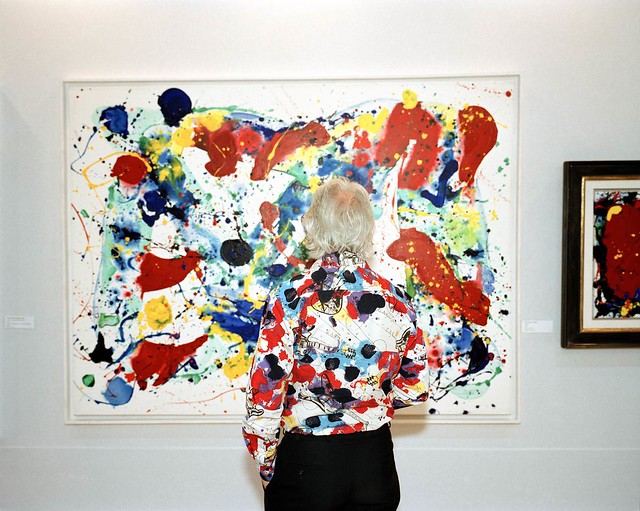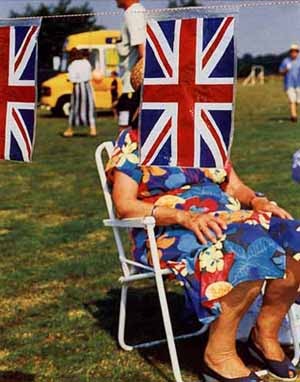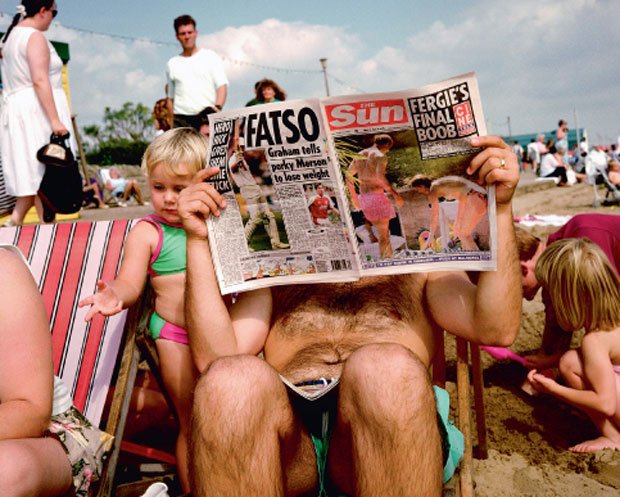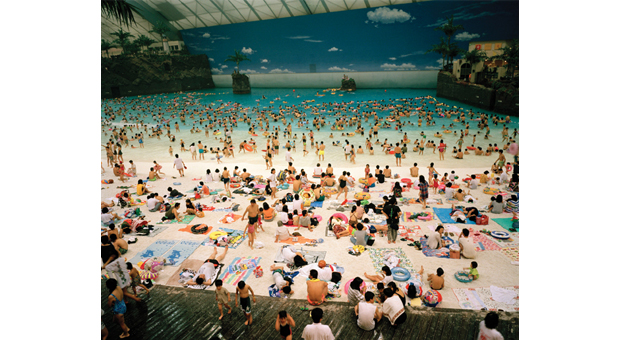
"Knotte, Belgium," Martin Parr, All rights reserved
First, an admission. Before I looked at his show, “Life’s a Beach,” at Aperture Gallery, I had convinced myself that Martin Parr’s hyper-bright, in-your-face ironies were mostly an exercise in hype -- a sort of art brand on the make. But I left the show thoroughly charmed.
How did that happen? Before this, I had only seen Parr’s work sized small, online or
in magazines, and had gotten the idea his pictures were supposed to be jokes. In fact, I enjoy jokes, but Parr’s images
had seemed to me detached and over-calculated, like a comedian’s punch lines
with choreographed pauses for laughter. Looking in the context of this show’s large
prints, I saw that his work is much more complicated than that.
Is Parr’s work funny? Yes, often. Does he shoot as an
outsider? Yes, of course. Parr could
never manage his pictures if he was also participating in the dramas swirling
around in the frame. On the other hand, he could never get the shots at all if
he didn’t have a participant’s instinctive knowledge of what’s going on.

"Art," Martin Parr, All rights reserved
I imagine Parr as a participant-observer, a sort of photo primatologist
among his peers. Put simply, he
understands that – released from workaday
discipline by holidays or special events – ordinary people behave like the complicated
primates we actually are. We gossip, flirt, eat, play games, make jokes, dress
up in uniforms and costumes, dance, drink, bask, show off, analyze each other’s
status, display awful – if exuberant – taste and so on. In these settings Parr seems to have
found his gift in another primate ritual.
He takes pictures.

"Art," Martin Parr, All rights reserved
In Parr’s career he has showed us ourselves abundantly -- through
50 books and over 80 major exhibitions of photographs, four movies, numerous TV
documentaries, membership in Magnum, a co-written scholarly history of photo
albums, an extensive post card collection and more.
The man loves pictures.

"Think of England," Martin Parr, All rights reserved
In “Life’s a Beach” Parr has for the first time assembled
his best work from a 30-year obsession with photographing beaches around the
world. The prints push-pinned to Aperture’s walls include work from Argentina, Brazil, China, Spain,
Latvia, Japan, the United States, Mexico, Thailand and the United Kingdom. For
Parr, beaches are “…that rare public space in which general absurdities and
local quirks seamlessly fuse together.”
Some of the images are indeed evocative of every culture. Parr’s
iconic 1997 shot of a sunbathing older woman, for instance, delivers a maximal
satiric jolt by cropping out everything but her glistening, sunburned face and
arms. Even in the savage heat of the mid-day beach, the woman wears all her gold
jewelry. Her thin, freshly-lipsticked
mouth is pursed grimly, and -- where her eyes ought to be -- surreal bright
blue protective eye-cups seem to pop with otherworldly rage.

"Sunbathing lady," Martin Parr, All rights reserved

"Sunbathing lady," Martin Parr, All rights reserved
Who is this terrifying woman? Why is she so angry? Parr
leaves it to our imagination. Every culture has agreed-upon types to refer to. The
picture was taken in Benidorm, Spain
-- perhaps the woman is a fierce duenna, strictly chaperoning a family’s sulky adolescent
daughter. Maybe the correct title should be dowager –she’s an updated British version of Wilde’s
Lady Bracknell. Other tribes will
assign their own special roles.

"American speedo," Martin Parr, All rights reserved

"Rio beach boy," Martin Parr, All rights reserved
Parr’s pictures also nail specific cultures. A garish stars-and-stripes-themed
speedo droops off the sagging ass of a middle-aged man from Miami; a godlike,
gleaming black beach boy from Rio sizes us up through designer sunglasses; in
places like New Brighton and Eastbourne, beachgoers in robes and sensible shoes sit in folding chairs
and read headlines like “I Want to Hang Them” or “Fergie’s Final Boob;” in
Miyazaki, Japan, hundreds of revelers frolic happily in artificial surf under fluorescent
lights in a place called Ocean Dome.
Other pictures move across the sticky divide between
cultures. For example, on a beach in Goa, India, a young Western couple encamped
with flip flops and towels are disconcerted by a large white sacred cow, which gazes
at them mournfully as two fully dressed Indian men stride purposefully by.
It’s interesting that so few of these cross-cultural shots
cause the viewer any real discomfort. The only picture in the show that is at
all disturbing depicts a big beefy Western man lounging under a palm tree, simultaneously
getting a manicure and a pedicure from two tiny Balinese. The picture has a slightly seedy, obscene
feeling. But it’s hardly gut-wrenching.
I wonder -- not
for the first time – why Parr chooses to take the viewer to the point of
laughing out loud but never to the verge of outrage. And then I wonder, why am I even thinking about chastising
Parr for not making me angry? By the
end of the show I decide to appreciate his gentleness. As a shooter, he has the
chutzpah to walk up to strangers and fire off his ring-flash from closeup
range, but the resulting photographs – though bold and arresting -- are the opposite of harsh. In fact, I’d
call them deeply sympathetic, even rather
fond.
Parr is a skilled satirist, but from the evidence, not an
angry one. To my eye he seems at
least as interested in entertaining viewers as in changing their mind. Enjoy
him.
More reviews on this blog
More reviews on this blog


1 comment:
Love Andrew's work - really captures the essence of our beautiful coastline, and it looks even better in real life!
beach art
Post a Comment